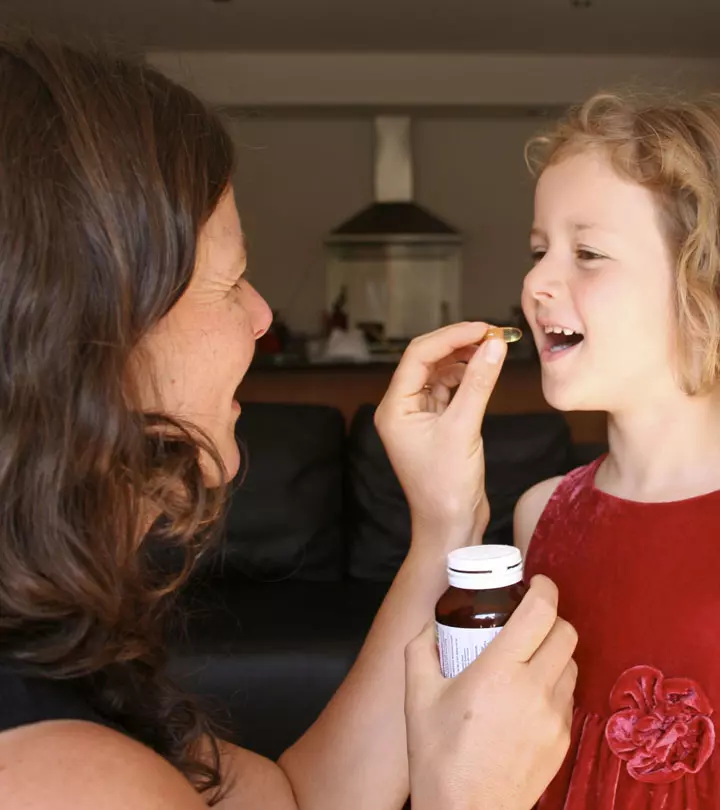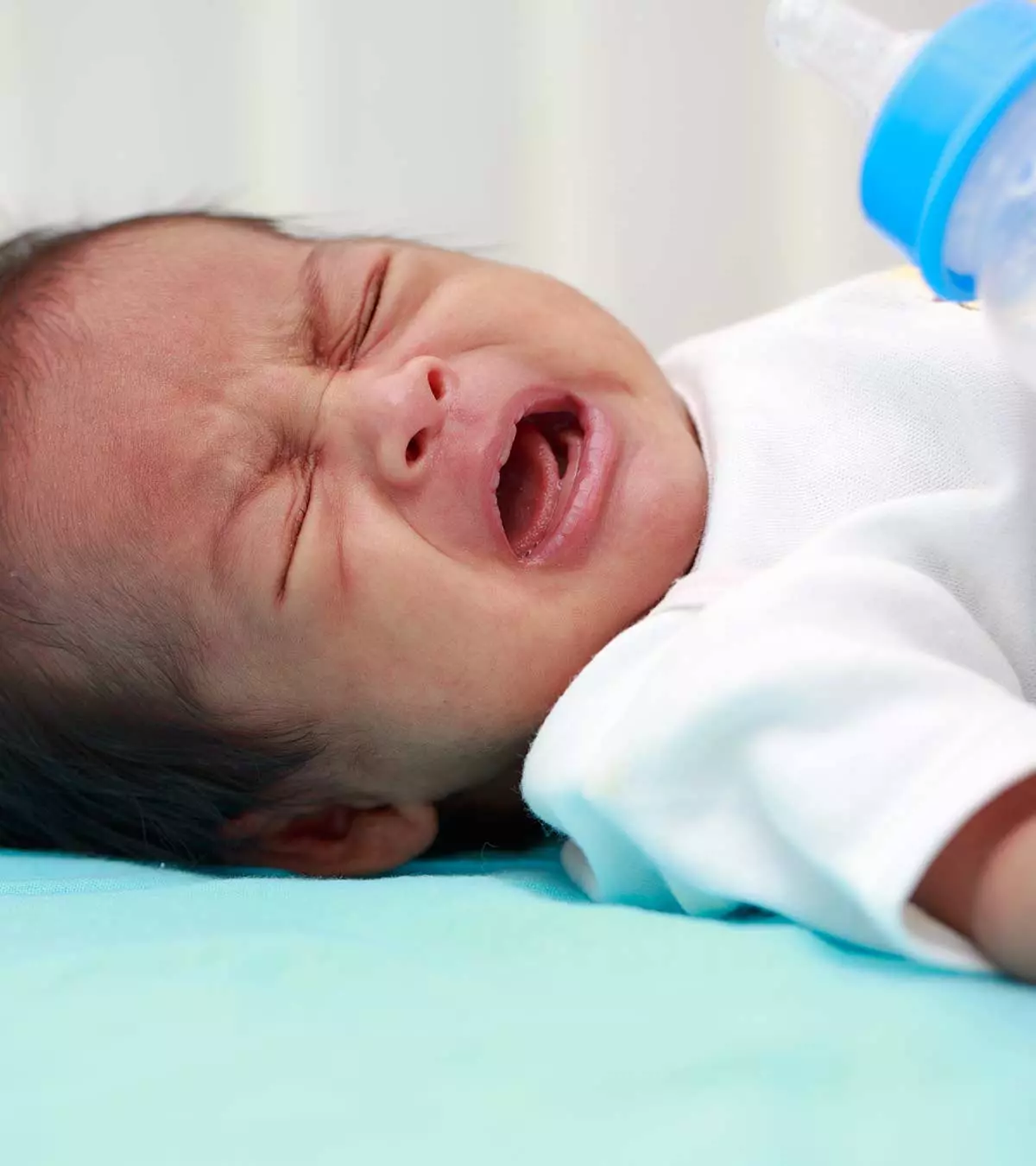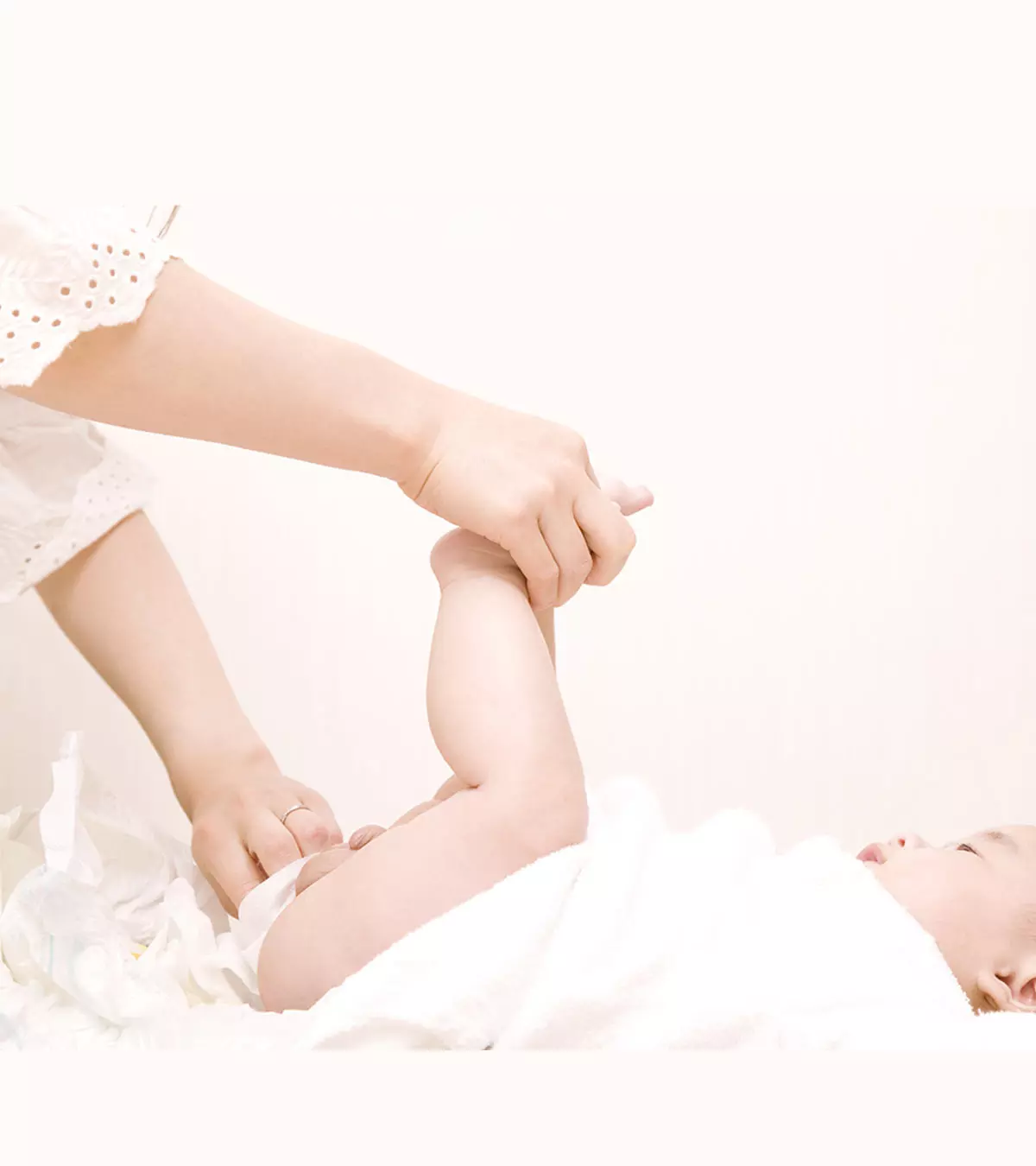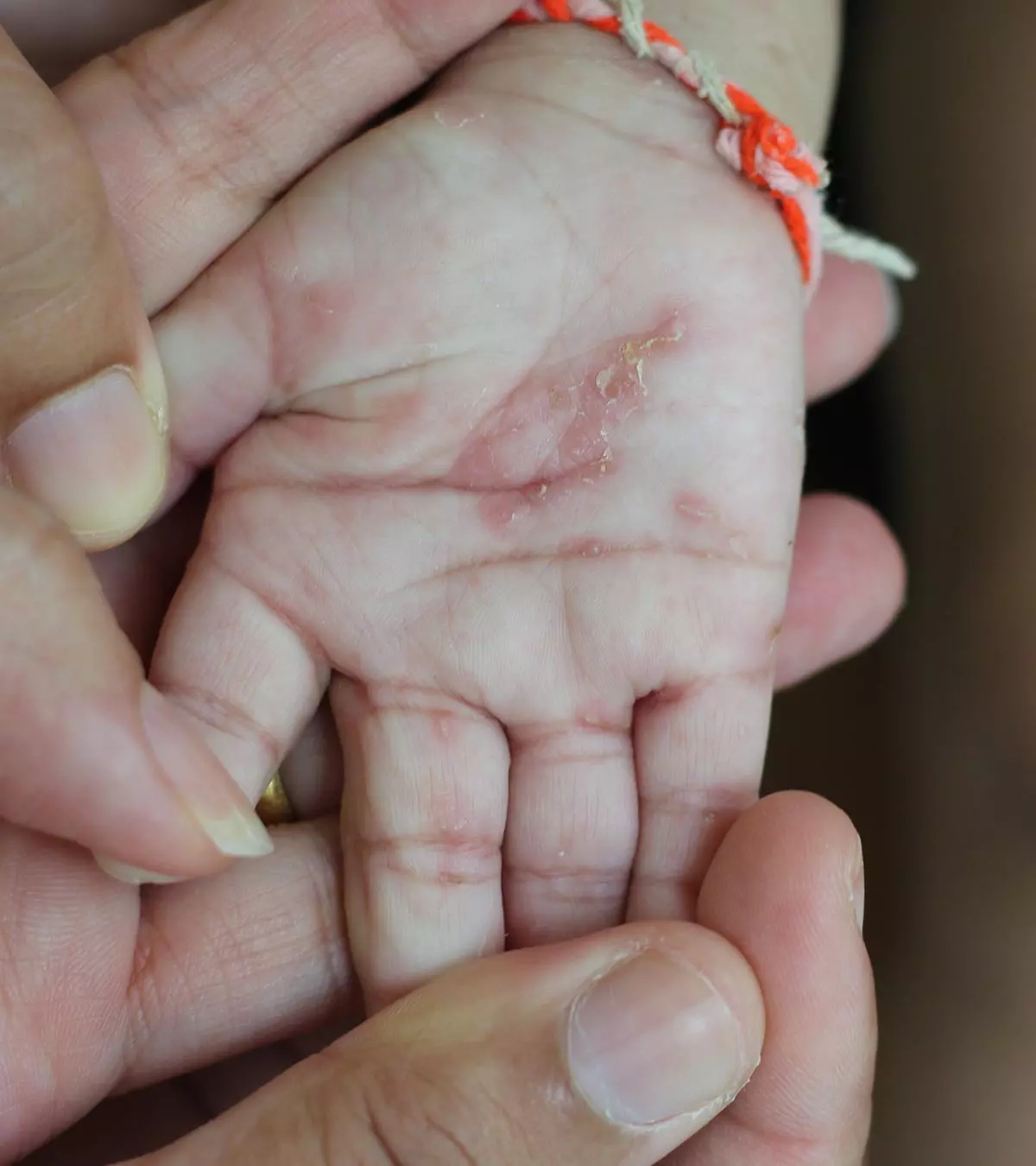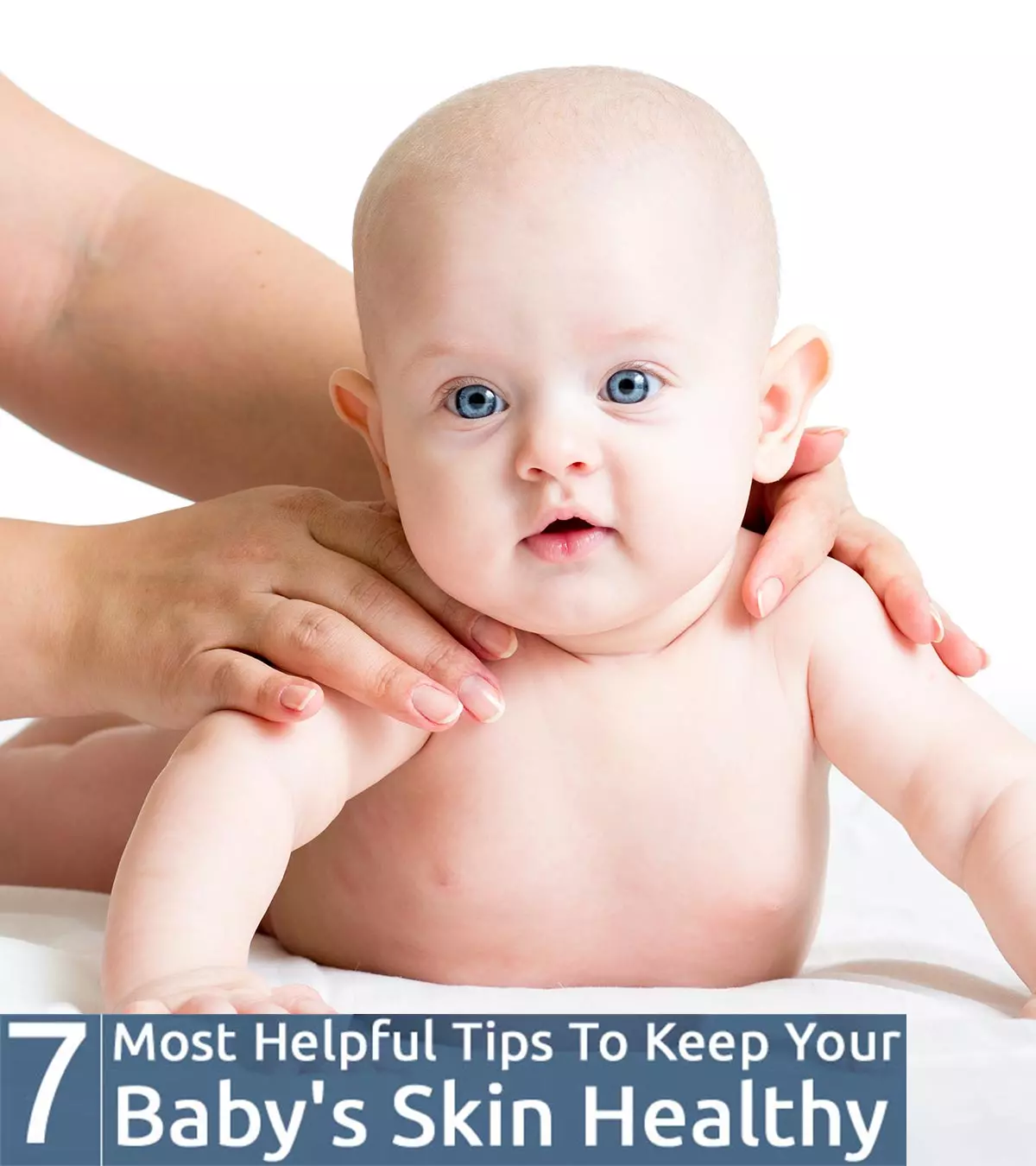
Image: Shutterstock

A baby’s skin is sensitive. Thus, you cannot use the same products for baby skin care that you use for yourself. The products you use for your baby should be chemical-free, gentle on the skin, dermatologically tested and natural.
Babies, especially newborns, are still adjusting to the harsh environment. Therefore, their skin is extra sensitive and easily reacts to even the slightest discomfort. For example, they can develop a rash or breakout from irritants such as soap, shampoos, and diapers. So, extreme care needs to be taken for their skin.
Since their skin is thinner and much more fragile, they are more susceptible to developing allergies within the first few months. Therefore, follow a daily skin care routine keeping their comfort and health in mind (1).
Read on as we tell you about some effective and useful tips on keeping your baby’s skin healthy.
Key Pointers
- Newborn babies have thinner and more porous skin, which makes them more susceptible to allergies and skin irritations.
- Practice gentle care by using mild soaps, baby powder to control sweating, and soft, skin-friendly diapers to prevent rashes.
- Choosing the right moisturizing products for dry skin will keep the skin hydrated.
- To keep the baby’s skin healthy, avoid using products with harsh chemicals.
Baby Skin Care
Do you know a human being has the best skin when he or she is a baby? Proper skin care can ensure that your baby can maintain great skin all their life. Here you will learn how to take care of baby skin & we’ve listed some of the best ways to ensure optimum skin health for your precious little one.
1. Bathing:

Image: IStock
Parents prefer to bathe their child every day. It is better to use shampoo and soaps which do not cause an allergic reaction to the baby. Prefer a soap with pH close to 5-5.5. Wash your baby’s skin with lukewarm water and a gentle soap. The room that you use to dry off your baby should be warm and all air conditioners and fans should be switched off to avoid the chill.
Do not try any new product on your baby’s skin. Do not use any antibacterial soaps as they may be too harsh for the sensitive skin of the baby. It is best to wipe the baby using natural cotton and smooth towels to gently take out the moisture out of the skin there by staying away from unexpected scratches (2).
2. Powdering:
You need to be even more careful while choosing a talcum powder for your baby. Choose products that are designed specifically for babies and avoid using powders that have fragrances and other chemicals as they may irritate the baby’s sensitive skin.
Stay away from powders that contain grains and choose herbal powders, especially for the diaper area. As a rule, it is best if you avoid powdering the diaper area, as it may lead to future complications or infections. It is advisable to consult your baby’s pediatrician before you introduce any new baby skincare products.
3. Nappies and Diapers:

Image: Shutterstock
The diapers that are used for babies are actually helpful for keeping the baby clean and fresh. However, certain diapers may also irritate the baby’s skin and cause a rash or infections (2). It is best to change the diaper as soon as you find your baby has ‘used’ it.
If you find that skin is irritated at the diaper area, choose another variety or brand. Remember to change your baby’s diaper as soon as he dirties it, because letting it stay for too long can cause infections (2).
While most newborns are prone to rashes, you need to take certain preventive measures and avoid them in the first place. Here are some guidelines you should follow for your newborn baby skin care.
 Caution
Caution4. Diaper Trouble:
often occurs due to skin irritation due to wet diapers left on for too long, too-tight diapers, or using a specific soap, wipes, or diaper (3).
- Change the diaper as soon as it is wet and after using wipes to clean the area, sprinkle some powder to keep the area dry and clean.
- Most baby skin rashes are not a serious problem, but few of them may be a sign of infection and need special care. If you find that the rashes are too serious, visit your pediatrician for better treatment right away.
 Point to consider
Point to consider5. Skin Problems:

Image: IStock
Generally, lots of babies have birthmarks (areas of skin have a slight discoloration) and this condition is not hereditary. Parents need not worry about birthmarks, as they cause absolutely no harm to the baby and need no treatment.
- Eczema is a red, itchy rash that may or may not occur in response to a cause. It usually occurs on the baby’s face, elbow, arms or behind knees and chest. According to the American Academy of Dermatology Association, 25% of all children have eczema, and 60% of all adults with eczema develop eczema before age one. If the child’s family experiences allergies, asthma or atopic dermatitis, the baby may be at a risk of getting affected by eczema. Use mild soaps and apply liberal amounts of a gentle moisturizer or cream.
- Some babies also tend to develop acne; however, they are not the same as teenage acne. If the problem persists, visit your pediatrician (4).
 Point to consider
Point to consider6. Dry Skin:
If your baby has dry skin, use a natural moisturizer to keep the skin hydrated, soft and supple. Pure coconut oil is a favorite (5).
- Avoid bathing your baby too often or for too long, as it may sap the vital nutrients from the skin, leaving it dull and dry.
- During your baby’s first month, gently sponge her with plain water two or three times a week; this should keep the baby clean while preventing her skin from losing its natural moisture.
- Use the best skin care products specially designed for babies. When using bath gels, shampoos, sunscreens, or lotions on newborns, ensure they are not allergic to those products.
7. General Baby Skin Care Tips:

Image: IStock
The newborn baby skin is very delicate and so is their immune system.
- Babies should not be exposed to direct sunlight until they are 6 months old. The tender skin of the baby can be protected with long-sleeved tops, pants and hats.
- Make sure that your little one’s new outfits are clean; it is preferable to wash (and soften) new outfits before your baby wears them (6).
- Prickly heat appears due to sweating in armpits, skin folds, neck diaper areas. Loose clothes and a cool environment are all you need to protect them from prickly heat rashes.
- Chemical detergents, talcum powders and certain baby products can cause skin irritation, rashes, dryness etc. Stick to using organic products as often as possible to protect your baby’s skin from harmful infections or allergic reactions.
- Use baby sunscreen with a good SPF value, preferably above 30, when stepping outside under direct sun.
Frequently Asked Questions
1. How can I improve my baby’s skin color?
Genes determine how melanin is distributed through the skin. Exposure to the sun also determines a baby’s skin color. Therefore, there isn’t much you can do to change your baby’s skin color (7).
2. Do babies need skin care?
Yes, a baby’s skin needs care. It is advisable to use products specifically designed for babies since they are mild and well-suited for a baby’s delicate skin (8).
3. What are some natural and organic alternatives to traditional baby skincare products, and are they effective?
Coconut and olive oil have been shown to be beneficial in healing a baby’s skin barrier and making their skin more permeable. On the other hand, mothers choose sunflower oil to massage their babies because of its healing and antibacterial properties (10).
4. What are some of the most effective home remedies for treating common skin issues in babies, such as eczema and cradle cap?
An oatmeal bath can be a safe option for babies to treat eczema effectively. Colloidal oatmeal can be bought from the store, which, when soaked in a bathtub, is known to help relieve itchiness and dryness on the skin (11). On the other hand, to treat cradle caps, applying a small amount of mineral oil or petroleum jelly on the scalp may be effective. It might loosen the scales on the scalp, which can then be removed using a soft brush (12).
The baby’s skin tends to develop rashes and allergies because of its sensitive nature. Therefore, it is important to pay attention to baby skin care to protect their skin. You can take good care of your baby’s skin by bathing them regularly with gentle soap, changing nappies and diapers often, applying mild moisturizers, using organic products, etc. Providing optimum skin care from early childhood ensures babies have problem-free skin as they grow.
Infographic: How To Care For Your Baby’s Healthy Skin?
Baby’s skin is softer and more sensitive than children’s and adults’ skin. Therefore, you must incorporate changes in the skincare routine to keep the baby’s skin healthy. Learn about essential skincare-related aspects for your baby in the following infographic.
Some thing wrong with infographic shortcode. please verify shortcode syntaxIllustration: Effective And Useful Tips To Keep Your Baby&039s Skin Healthy
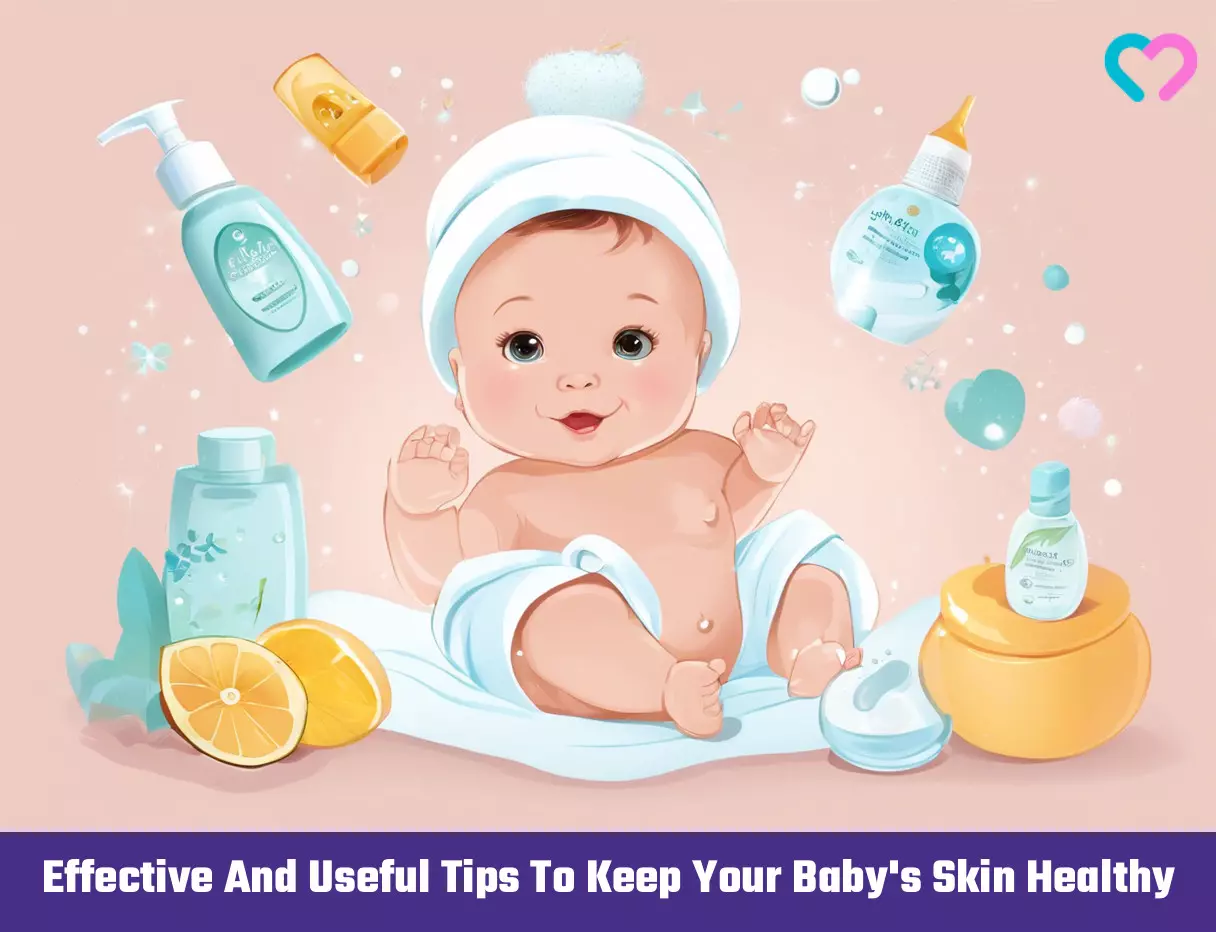
Image: Stable Diffusion/MomJunction Design Team
Refer to the following video for detaila on how to take care of your newborn’s sensitive skin and the do’s and dont’s of the same.
References
- Skin findings in newborns.
https://medlineplus.gov/ency/article/002301.htm - Skin care for your baby.
https://www.ncbi.nlm.nih.gov/pmc/articles/PMC2528704/ - Diaper rash.
https://medlineplus.gov/ency/article/000964.htm - Zekayi Kutlubay et al.; (2017); Newborn Skin: Common Skin Problems.
https://www.ncbi.nlm.nih.gov/pmc/articles/PMC5574071/ - Coconut oil.
https://medlineplus.gov/druginfo/natural/1092.html - Sun safety for children and babies.
https://www.ucsfbenioffchildrens.org/education/sun-safety-for-children-and-babies - How to treat diaper rash.
https://www.aad.org/public/everyday-care/itchy-skin/rash/treat-diaper-rash - Diaper rash.
https://kidshealth.org/en/parents/diaper-rash.html - Avoiding dry winter skin in babies and toddlers.
https://www.healthychildren.org/English/health-issues/conditions/skin/Pages/Avoiding-Dry-Winter-Skin-in-Babies-and-Toddlers.aspx - Özgür Alparslan; (2025); Baby Massage and Massage Oils: Are They Safe?
https://dergipark.org.tr/en/download/article-file/2106562 - HOME REMEDIES: WHAT CAN RELIEVE ITCHY ECZEMA?
https://www.aad.org/public/diseases/eczema/childhood/itch-relief/home-remedies - Cradle Cap (Seborrheic Dermatitis in Infants).
https://my.clevelandclinic.org/health/diseases/15786-cradle-cap-seborrheic-dermatitis-in-infants
Community Experiences
Join the conversation and become a part of our nurturing community! Share your stories, experiences, and insights to connect with fellow parents.
Read full bio of Dr. Anuradha Bansal
Read full bio of Jessica Albert
Read full bio of Dr. Ritika Shah
Read full bio of Shinta Liz Sunny









